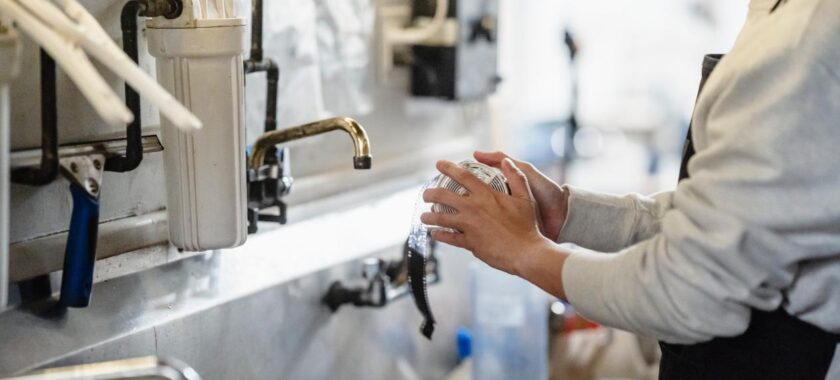Most Common Water Leaks in House
While water leaks can happen in numerous locations throughout your house, certain areas tend to be more susceptible to leakage issues compared to others. Here are the most common places you might encounter a water leak:
Toilets – Toilets are notorious for hidden leaks, often caused by worn-out flappers or damaged valves.
Faucets – Dripping faucets can waste an incredible amount of water, often due to worn-out washers or seals.
Water Heaters – Leaks in water heaters are typically caused by corroded pipes or broken pressure relief valves.
Washing Machines – Check for loose connections or worn-out hoses if you suspect a leak in your washing machine.
Pipes – Burst or leaking pipes are often the result of freezing temperatures or corrosion.
According to Waterwise, an astonishing 3,000 million litres of water or more is lost daily in the UK due to leakage issues. Don’t let your home contribute to these staggering statistics!
How to Find Leak in Wall or Ceiling
When a leak occurs inside your wall or ceiling, it can be challenging to pinpoint its source. Nonetheless, some key indicators can aid you in identifying the problem:
Discolouration – The presence of yellow or brown blemishes on your walls or ceilings often suggests a leak.
Mould or Mildew – Persistent mould or mildew growth may be a sign of a hidden leak.
Bulging or Sagging – A bulging or sagging ceiling is usually a sign of water accumulation from a leak.
In case you believe there’s a water leak within your wall or ceiling, it’s vital to tackle the problem immediately to prevent further complications. Left unchecked, water leaks can lead to significant structural damage and health issues caused by mould growth.
Who to Call for Water Leak in Wall
Once you’ve ascertained the presence of a water leak within your wall, it’s essential to enlist the help of expert technicians to address the issue. At ProFlush, we have the necessary skills and tools to locate and repair leaks inside walls and ceilings. Refrain from attempting to resolve this matter by yourself – the damage can rapidly worsen if not dealt with appropriately.
How to Find a Water Leak Under Concrete
Finding a water leak under concrete can be challenging, but advanced technologies have made it easier for plumbers to locate and repair these leaks. Professionals typically use listening devices or ground-penetrating radar to pinpoint the source of the leak, allowing them to repair it with minimal disruption to your property.
How Does a Plumber Find a Water Leak Underground
Professional plumbers use various methods to find underground water leaks, including acoustic leak detection, tracer gas detection, and infrared thermography. These techniques allow plumbers to locate the leak without the need for extensive digging or property damage.
In conclusion, dealing with water leaks can be a major headache for homeowners. However, Nonetheless, by acquiring the appropriate know-how, support, and expert help, you can efficiently identify and tackle water leak problems. By swiftly tackling water leaks, you not only save time and money in the long run, but also safeguard your home’s structural integrity, retain its value, and promote your family’s health. It’s equally important to prevent water leaks as it is to learn how to locate them. Through proactive maintenance of your plumbing system, you can minimise the chances of leaks developing in the first place.
This includes regular inspections of pipes, valves, connections, and appliances, as well as promptly addressing any signs of wear and tear.
Remember, when it comes to water leaks, early detection and repair are crucial to minimising damage and expense. Ignoring the problem or attempting DIY fixes without the necessary skills and experience can often make matters worse. Rely on the expertise of professionals like our team at ProFlush to ensure the best possible outcome for your home and plumbing system.
Our dedication to excellence, customer contentment, and efficient leak detection and repair solutions positions us as the preferred option for homeowners throughout Australia. At ProFlush, we understand the importance of prompt service and attention to detail when it comes to water leaks. We’re always ready to go the extra mile for our clients, ensuring that their homes remain leak-free and comfortable for years to come.
Don’t let water leaks ruin your peace of mind. Contact ProFlush today and let our team of experts help you maintain a dry, safe, and comfortable home for you and your loved ones. Experience the ProFlush difference, and rest easy knowing your home’s plumbing system is in good hands.
Frequently Asked Questions
Here are some popular questions about finding water leaks, according to Google’s ‘People Also Ask’ section:
How can I tell if I have a water leak?
Signs of a water leak include increased water bills, damp spots or discolouration on walls and ceilings, mould or mildew growth, and a persistent damp or musty smell in your home.
Can a water leak cause mould?
Yes, a water leak can lead to mould growth, particularly in dark, damp, and poorly ventilated areas. Mould can cause respiratory problems, allergic reactions, and other health issues, so it’s essential to address water leaks as soon as possible.
What is the cost to locate and repair a water leak?
The expenses associated with detecting and repairing a water leak can fluctuate based on factors such as the leak’s position and severity. Typically, one can expect to spend anywhere from $150 to $400 on leak detection services, along with an additional $200 to $1,000 for carrying out the necessary repairs.
How long does it take to find a water leak?
The duration required to identify a water leak can differ, depending on factors such as the leak’s magnitude, its whereabouts, and the seriousness of the issue at hand.
Sometimes, a leak can be detected in just an hour; however, more intricate scenarios might necessitate numerous hours or even days of thorough examination.
How do I prevent water leaks in my home?
Regular maintenance and inspection of your plumbing system are crucial in preventing water leaks. Be sure to check pipes, valves, and connections regularly for signs of wear and tear. Additionally, insulating your pipes and maintaining your water heater can help prevent leaks caused by freezing or corrosion.




